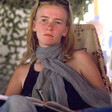The Electronic Intifada Haifa 13 September 2012

The author (right) with Cindy Corrie. (Photo courtesy of Janan Abdu)
The judge asked if the parents of Rachel Corrie were present in the courtroom. I assumed he wanted to apologize for the fact that their daughter had been killed by an Israeli military bulldozer or possibly to express solidarity and understanding for the family’s situation. But apparently the judge was only following protocol, and had no solidarity to offer.
He gave his ruling in Central Courtroom 603 in Haifa. He said Rachel was in a peace organization that had failed in its duties by venturing into a war zone, in the “Philadelphi Corridor” in Gaza. He added that the use of the bulldozer was legitimate and he rejected the family’s argument that the killing was intentional.
The judge accepted the government’s claim that its investigation into Rachel’s death had been thorough and that the use of the bulldozer in a war zone accorded with international law.
The Corrie family’s lawyer, Hussein Abu Hussein, said: “This is a bad ruling. Rachel Corrie was killed. We are talking about a huge bulldozer from which it was impossible not see this young woman. Rachel was protecting the rights of Palestinians to live in dignity in their homes. This ruling gives legitimacy to murder and to the crimes that were committed and are still committed in the occupied territories. We thank all those human rights activists who have stood alongside us through our difficult journey.”
No words
After the court’s decision, I saw Rachel’s family at their press conference in the Colony Hotel in Haifa, next to the Prisoners’ Square — the name our group gave the square last September when the battle of the Palestinian hunger strikers began.
Afterwards, I went looking for them. I first saw Sarah, Rachel’s sister, sitting on the hotel balcony. She recognized me, hugged me and said: “I think about you often.”
We had a chat and I felt like I was apologizing, even though I was not the killer. There are no words that can properly apologize to a family that lost their daughter in such a brutal way, with Rachel’s body crushed by the bulldozer. I apologized for their pain and said: “I know how it feels to battle against the Israeli court system. My heart is with you. I know you did not expect much but still it is hard.”
I had written a short message that I meant to leave at the hotel reception but, given that I was with Sarah, I gave it to her by hand. We exchanged phone numbers and agreed to meet again.
She said they were staying for two weeks, and of course asked about my jailed husband Ameer and the girls. I asked her about their future plans and she replied: “We are still in the shock phase and need time to think.”
I left towards my car. There were local and foreign TV crews on each side of the road. Before I reached my car I saw Cindy, Rachel’s mother, being interviewed by one of the TV channels. And on the other side Craig, Rachel’s father, was waiting for his turn.
I found myself apologizing again, this time to Craig. I asked him: “Did you have any expectations?” He said he didn’t but still it had been very hard. Then he began his interview.
Shared pain
Cindy finished hers and at that moment saw me. No words were necessary. We hugged and I found myself crying with her. She wept as the mother of a martyr, and I as the wife of a political prisoner. We share the same lawyer, but more significantly we also share the pain inflicted by Israel’s courts, injustices, and its racism.
Our sadness was shared but her sadness is forever. She is a mother who lost her daughter because she fought for justice, killed by this country’s profound racism. A country that not only refuses to apologize for its crimes but increases its aggression towards everything that is Palestinian and everyone who supports Palestine.
They killed a young woman because she carried love and compassion for our homeland.
Cindy said: “You’re always on my mind.” She asked me about my family and we talked about how it is not possible to trust the country’s institutions and how important it is to reveal its criminal practices.
After we had wiped away our tears, a journalist took a picture of us together. In the background is the beautiful Mount Carmel and Abbas Dome. It looks green and tranquil. But it is not a normal tranquility: it is one mixed with sadness and hope.
She gave me the smile of the mother of a martyr. It was a smile that revealed her strength and determination to continue. She said: “Continue, Janan, to do what you are doing. Our hearts are with you.”
I said the same to her, and we agreed to meet again.
Janan Abdu is an activist and a Palestinian researcher living in Haifa. This article was translated from Arabic by Sally Azzam Cook with editing by Jonathan Cook.


